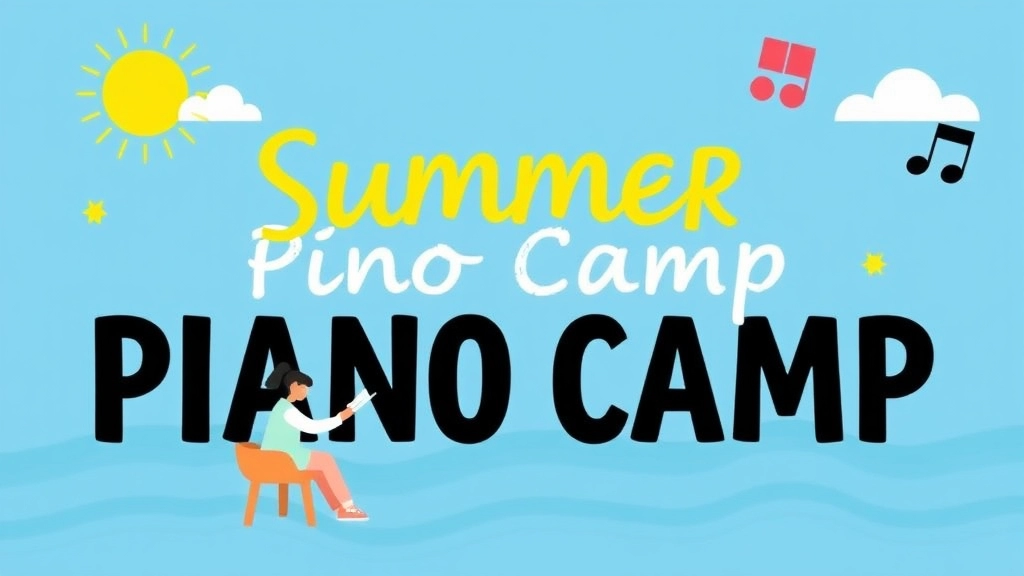Thinking about sending your child to a Summer Piano Camp?
You’re in the right place. These camps are designed to enhance piano skills through immersive experiences, focusing on everything from technique to performance opportunities. Whether your child is a beginner or an advanced pianist, there’s a camp that caters to their skill level, offering masterclasses, private lessons, and recitals to showcase their progress.
What to Expect at a Summer Piano Camp
At a Summer Piano Camp, expect a structured yet engaging daily schedule filled with:
- Practice sessions
- Collaborative learning through duets and ensembles
- Plenty of time for fun and relaxation
Notable Camps
Camps like those at Interlochen and Baylor University provide a balanced mix of rigorous training and enjoyable activities, ensuring a memorable summer for young musicians. Ready to take the plunge? Let’s explore the best options for your budding pianist.
Choosing the Right Summer Piano Camp for Your Skill Level
Alright, so you’re thinking about diving into a summer piano camp. Great choice! But let’s get realâhow do you pick the right one for your skill level? Whether you’re a beginner or a seasoned pianist, finding the perfect camp can feel like a maze. Let’s break it down.
What’s Your Current Skill Level?
First off, you need to be honest with yourself about where you stand. Are you just starting out, or have you been playing for years? Your skill level will determine the type of camp you should look for. Here’s a quick way to gauge:
- Beginner: You know the basics, maybe a couple of simple pieces.
- Intermediate: You can play more complex pieces, understand some music theory.
- Advanced: You’re tackling challenging compositions and perhaps even composing your own music.
Types of Camps Available
Once you know your skill level, you can start looking at different types of camps. Here’s a quick rundown:
- Beginner Camps: Focus on fundamentals, simple pieces, and basic music theory.
- Intermediate Camps: More advanced pieces, deeper dive into theory, and some performance opportunities.
- Advanced Camps: Masterclasses, private lessons, and high-level performances.
What Are Your Goals?
Next, think about what you want to get out of the camp. Are you looking to improve your technique, learn new pieces, or maybe even perform? Different camps offer different experiences:
- Technique Improvement: Look for camps with a strong focus on drills and exercises.
- Performance Opportunities: Camps that offer recitals or concerts.
- Comprehensive Learning: Camps that combine theory, technique, and performance.
Check the Camp’s Reputation
Not all camps are created equal. Do a bit of homework:
- Read Reviews: Check out what past attendees have to say.
- Ask Around: Talk to your piano teacher or fellow musicians.
- Social Media: Look for posts and comments about the camp.
Location and Duration
Consider how far you’re willing to travel and how long you want to stay:
- Local Camps: Easier on the budget and less travel hassle.
- International Camps: Offers a broader experience but can be pricey.
- Short-term vs Long-term: Some camps last a week, others a month. Choose what fits your schedule.
Cost and Scholarships
Finally, let’s talk money. Piano camps can be expensive, but there are often scholarships available:
- Camp Fees: Compare the costs of different camps.
- Scholarships: Many camps offer financial aid. Don’t be shyâapply!
Real Stories
I remember when I was picking my first piano camp. I was nervous, unsure if I was good enough. But then I found a camp that matched my skill level and goals perfectly. It changed my life. I met amazing people, learned so much, and even performed in a recital. Trust me, finding the right camp is worth the effort.
If you’re looking for a well-rounded experience, you might want to consider camps that offer a variety of activities. For instance, there are camps that provide fun and skill development in other areas like golf, or even specialized camps such as the Jiu-Jitsu summer camp for those interested in martial arts.
What to Expect at a Summer Piano Camp
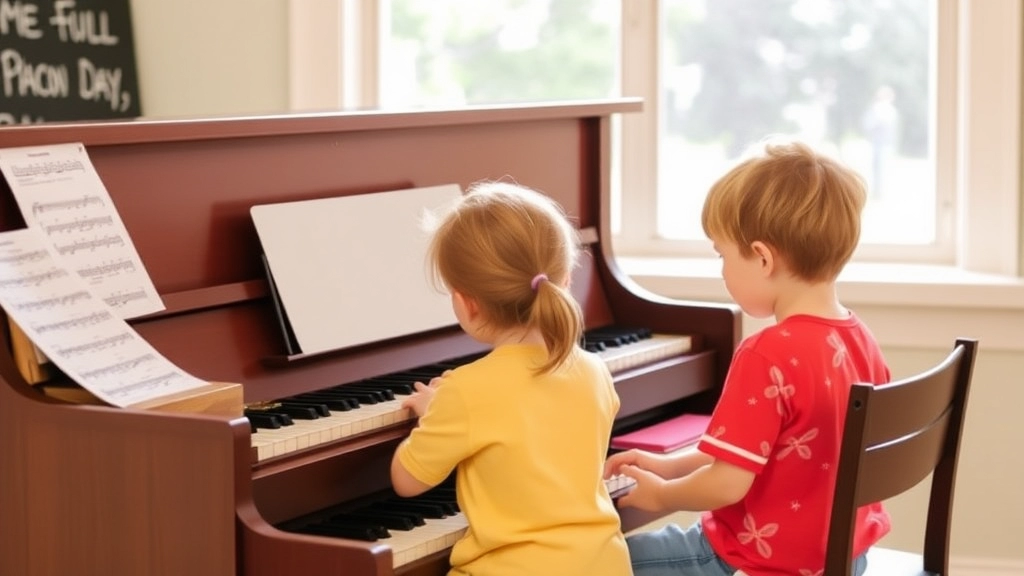
Ever wondered what really goes down at a summer piano camp?
You’re not alone.
Many aspiring pianists have the same questions.
Let’s dive right in.
A Typical Day at Camp
First off, every day is packed.
Morning Sessions:
- Warm-up exercises
- Technique drills
- Sight-reading practice
Afternoon Sessions:
- Masterclasses
- Private lessons
- Ensemble rehearsals
Evening Activities:
- Performance practice
- Social events
- Free time to explore
Masterclasses and Private Lessons
One of the biggest perks?
Masterclasses.
You get to learn from the pros.
They break down complex pieces and share insider tips.
Private lessons are another highlight.
You get one-on-one time with a top-notch instructor.
This is where you can really hone your skills.
Performance Opportunities
Expect plenty of chances to perform.
From recitals to ensemble performances, you’ll be on stage a lot.
This is your time to shine and get feedback.
Social Life and Networking
It’s not all about the piano.
You’ll meet like-minded musicians.
Make friends.
Network.
And yes, there’s time to chill and have fun.
Facilities and Resources
State-of-the-art pianos.
Practice rooms.
Music libraries.
Everything you need to succeed.
Real Stories
Take Sarah, a beginner who attended last summer.
She was nervous at first.
But by the end, she was performing confidently in front of an audience.
Or John, an advanced pianist.
He says the masterclasses were game-changers for him.
Performance Opportunities at Summer Piano Camps
Ever wondered if summer piano camps are worth it? Let’s dive into one of the biggest perks: performance opportunities. If you’re like me, the thought of performing in front of an audience can be both exciting and nerve-wracking. But trust me, it’s one of the best ways to grow as a pianist.
Why Performance Opportunities Matter
Performing isn’t just about showing off your skills. It’s about building confidence, learning stage presence, and receiving feedback that you can’t get from practising alone. Plus, let’s be real â it’s a total rush!
Key Benefits:
- Boosts Confidence: The more you perform, the less scary it becomes.
- Stage Presence: Learn how to connect with your audience.
- Constructive Feedback: Get tips from pros and peers to improve your playing.
Types of Performances You Can Expect
At summer piano camps, you’ll find a variety of performance opportunities. Here’s a quick rundown:
- Recitals: These are formal performances where you can showcase what you’ve been working on. Think of it as your moment to shine.
- Masterclasses: Perform in front of a small group and get immediate feedback from an expert. It’s like a mini-lesson in front of an audience.
- Ensemble Performances: Ever played in a duet or a larger group? It’s a blast and teaches you how to listen and blend with others.
- Impromptu Performances: Sometimes, camps have casual performance sessions where you can play without the pressure of a formal setting.
Real Stories from Campers
One of my mates, Sarah, attended a summer piano camp last year. She was super nervous about performing in the final recital but decided to go for it. Not only did she nail her piece, but she also got invaluable feedback from the camp’s director. She came back with a newfound confidence and a bunch of tips to work on.
How to Make the Most of These Opportunities
Here’s how you can make the most out of your performance opportunities at camp:
- Prepare Thoroughly: Know your pieces inside and out.
- Stay Calm: Easier said than done, but deep breathing and visualising success can help.
- Take Notes: Write down the feedback you receive so you can work on it later.
- Network: Chat with other campers and instructors. You never know what you might learn from a casual conversation.
For those interested in a broader range of camp activities, be sure to check out our guide on top summer camp games and activities. And if you’re looking for camps that focus on the arts, don’t miss our ultimate guide to top art camps for summer 2024.
Daily Schedules: A Glimpse into Camp Life
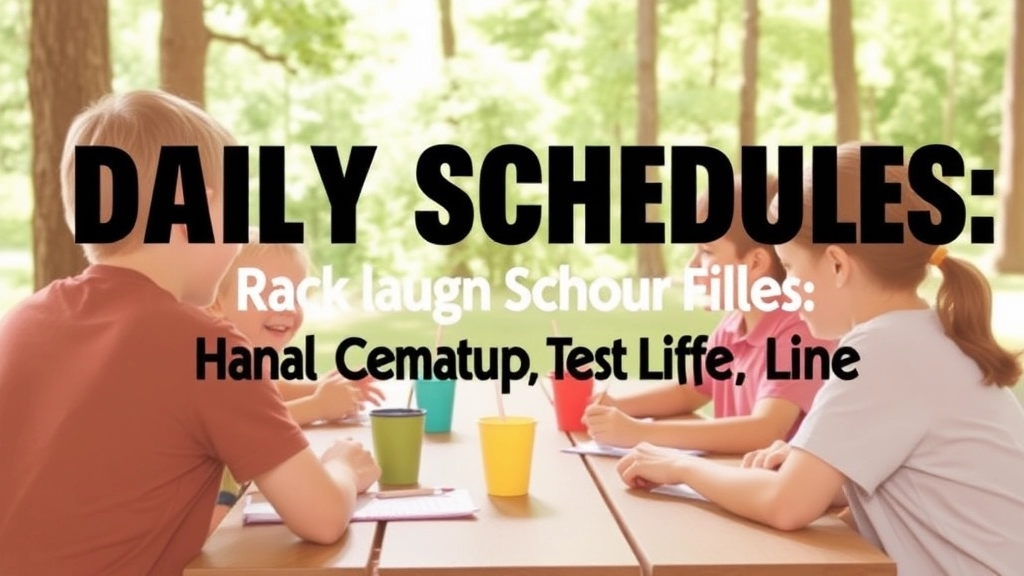
Ever wondered what a day at a summer piano camp looks like?
Let’s dive in.
Morning Warm-Ups
First thing in the morning, you’ll probably start with some warm-up exercises. Think scales, arpeggios, and finger drills.
It’s like stretching before a workout.
Practice Sessions
After warming up, you’ll have dedicated practice time.
This is where the magic happens.
You get to apply what you’ve learned and really hone your skills.
Masterclasses
Next up, masterclasses.
Imagine learning from top-notch pianists who’ve been in the game for years.
They’ll share tips, techniques, and maybe even a few trade secrets.
Break Time
Don’t worry, it’s not all work.
You’ll have breaks to relax, grab a snack, and chat with fellow campers.
Lunch
Lunchtime is a great opportunity to refuel and socialise.
You might even swap tips and stories with new friends.
Afternoon Activities
Post-lunch, the schedule often includes more practice sessions, ensemble work, or theory classes.
This is where you get to collaborate and learn from others.
Private Lessons
One-on-one time with an instructor.
This is gold.
You get personalised feedback and can focus on areas where you need improvement.
Evening Recitals
Many camps wrap up the day with recitals or performances.
It’s a chance to showcase what you’ve learned and get comfortable playing in front of an audience.
Free Time
Finally, some downtime.
Whether it’s exploring the campgrounds, playing games, or just chilling with new friends, this is your time to unwind.
Lights Out
After a full day, it’s lights out.
Rest up because tomorrow, you’ll do it all over again.
Why This Matters
Knowing what to expect can help you prepare mentally and physically.
It’s a packed schedule, but each part is designed to make you a better pianist.
Piano Camps for Beginners vs. Advanced Pianists
Alright, so you’re thinking about diving into a summer piano camp, but you’re stuck on one big question: Should you go for a beginner’s camp or an advanced one? This is one of the most common dilemmas people face, and it’s crucial to get it right to make the most of your experience.
What’s Your Skill Level?
First off, let’s figure out where you stand. Are you just starting out, or have you been playing for years? Here’s a quick way to assess your skill level:
- Beginners:
- Just starting out or have only been playing for a year or two.
- Still learning basic scales and simple pieces.
- Need guidance on reading sheet music and basic techniques.
- Advanced Pianists:
- Have been playing for several years.
- Comfortable with complex pieces and advanced techniques.
- Can sight-read and have a good grasp of music theory.
What to Expect at a Beginner Piano Camp
If you’re a beginner, a piano camp can be a game-changer. Here’s what you can expect:
- Foundational Skills: Focus on basics like scales, chords, and simple pieces.
- Guided Practice: Lots of one-on-one time with instructors to correct your form and technique.
- Theory Lessons: Basic music theory to help you understand what you’re playing.
- Supportive Environment: Everyone’s in the same boat, so there’s no pressure to be perfect.
What to Expect at an Advanced Piano Camp
For advanced pianists, summer camps offer a whole different set of benefits:
- Masterclasses: Learn from top-tier pianists and get insights you won’t find in regular lessons.
- Complex Repertoire: Work on challenging pieces that push your limits.
- Performance Opportunities: Play in recitals and maybe even competitions.
- Networking: Meet other talented pianists and make connections that could last a lifetime.
Stories and Examples
I remember when I first attended a beginner camp, I was super nervous. But guess what? Everyone else was in the same boat, and we all grew together. Fast forward a few years, and I found myself at an advanced camp, playing pieces I once thought were impossible. The journey from beginner to advanced is incredible, and each camp offers unique benefits.
Making the Right Choice
So, how do you decide? Here are some tips:
- Self-Assessment: Be honest about your current skill level.
- Camp Curriculum: Look at what each camp offers. Do they align with your goals?
- Talk to Past Attendees: Get insights from people who have attended the camps you’re considering.
For more insights on choosing the right camp, check out our comprehensive guide on summer camp costs and explore some heartwarming and hilarious summer camp stories to get a feel for the camp experience.
Masterclasses and Private Lessons: Enhancing Your Piano Skills
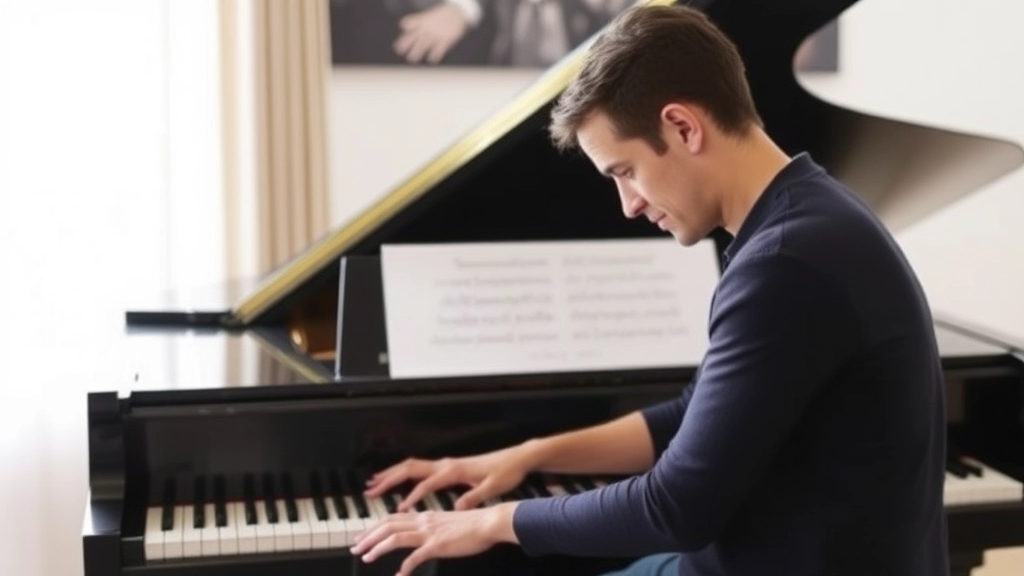
Ever wondered how to take your piano skills to the next level?
That’s where masterclasses and private lessons come in.
These are game-changers, folks.
What Exactly Are Masterclasses and Private Lessons?
Masterclasses are like group sessions where you play in front of a bunch of other students and a top-notch instructor.
Think of it as a live, interactive workshop.
You get immediate feedback, and guess what?
You also learn from others’ mistakes and successes.
Private lessons, on the other hand, are one-on-one sessions with a pro.
Personalised attention.
Tailored guidance.
Why Are They So Important?
Let’s break it down:
- Immediate Feedback: No waiting around. You get instant tips on what to improve.
- Personalised Guidance: Specific to your style and skill level.
- Motivation Boost: Seeing others perform can push you to do better.
- Networking: Meet like-minded folks and maybe even future collaborators.
Real Stories, Real Benefits
I remember my first masterclass.
Nervous? Absolutely.
But the feedback I got was pure gold.
I learned more in that one session than I did in months of practice.
And the private lessons?
Game-changer.
My instructor pinpointed exactly what I needed to work on.
Tips to Make the Most Out of These Sessions
- Be Open to Criticism: It’s all about growth.
- Take Notes: You won’t remember everything. Write it down.
- Practice What You Learn: Immediately. Don’t wait.
- Ask Questions: No such thing as a stupid question.
Collaborative Learning in Piano Camps: Duets and Ensembles
Ever wondered what it’s like to play piano with others? I mean, really play, not just the occasional duet with your teacher. Collaborative learning in piano camps is where the magic happens, and trust me, it’s a game-changer.
Why Collaborative Learning?
First off, let’s talk about why this matters. You’re probably thinking, âI’m here to improve my solo skills, why bother with duets and ensembles?â Well, here’s the deal:
- Teamwork Skills: Playing in a group teaches you how to listen and adapt. You’ll learn to sync with others, something you can’t get from solo practice.
- Improved Timing: Keeping in time with others sharpens your rhythm skills.
- Broadened Horizons: You get exposed to different styles and techniques. It’s like a buffet of musical knowledge.
Real-Life Example
At my first summer piano camp, I was paired with a violinist for a duet. I was skeptical at first. But by the end of the week, I realized my timing and expression had improved drastically. Plus, we nailed our performance, and it felt amazing.
How It Works
So, how does collaborative learning actually go down at these camps? Here’s a breakdown:
- Duets: You and another pianist or instrumentalist will work on a piece together. It’s a great way to build chemistry and understand musical dialogue.
- Ensembles: This could be a trio, quartet, or even a small orchestra. You’ll be assigned parts and will rehearse together, often culminating in a performance.
- Group Feedback: After rehearsals, you’ll get feedback not just from instructors but from your peers too. It’s a collective learning experience.
What to Expect
Expect to be pushed out of your comfort zone. And that’s a good thing! Here’s what a typical collaborative session might look like:
- Warm-Up: Start with some basic scales or exercises to get everyone in sync.
- Rehearsal: Dive into the piece, breaking it down section by section.
- Feedback Loop: After a run-through, discuss what worked and what didn’t.
- Final Run: Put it all together for a final performance.
Tips for Success
Want to make the most out of your collaborative learning experience? Here are some tips:
- Be Open-Minded: You might not like every piece or partner, but there’s always something to learn.
- Communicate: Don’t be afraid to speak up if something isn’t working. Collaboration is all about dialogue.
- Practice on Your Own: Make sure you know your part inside and out. It makes group rehearsals smoother.
For more on making the most of your summer camp experience, check out our ultimate summer camp pack list and discover how to become a summer camp mentor.
Benefits of Attending an International Piano Camp
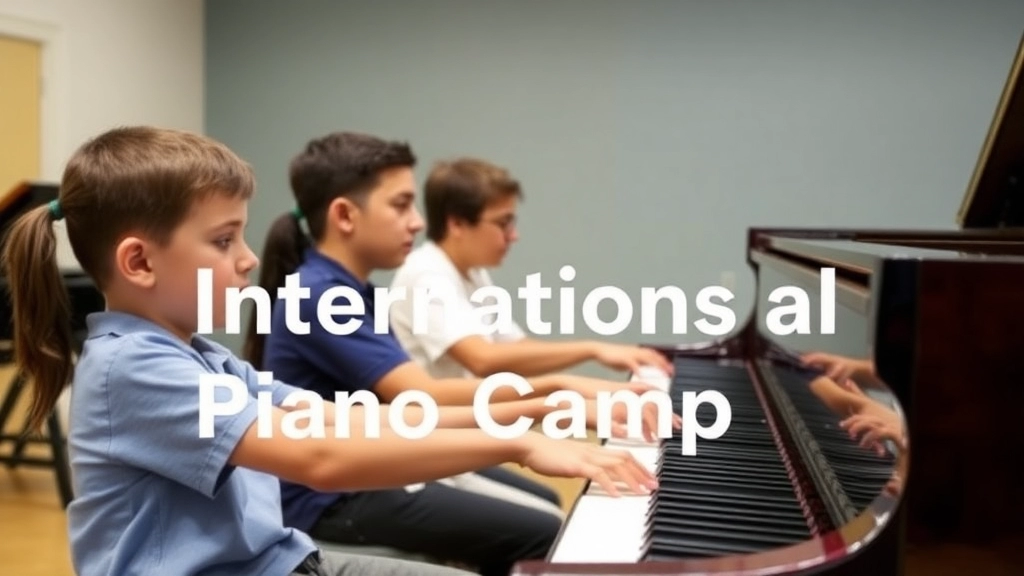
Ever wondered if attending an international piano camp is worth it?
Let’s dive in.
Broaden Your Horizons
Going international means exposure to new cultures and perspectives.
You’ll meet pianists from all over the world.
And that’s not just cool—it’s enriching.
Top-Notch Instruction
International camps often attract the best instructors.
We’re talking about world-class pianists and teachers.
You’ll get insights and techniques you won’t find anywhere else.
Networking Opportunities
Imagine the connections you can make.
Future collaborations, friendships, and even career opportunities.
It’s not just about the music; it’s about who you meet.
Immersive Learning Environment
Being in a different country means you’re fully immersed.
No distractions, just pure focus on improving your craft.
Travel and Adventure
Who doesn’t love a bit of adventure?
You get to explore a new place while doing what you love.
Real Stories
I remember a friend who went to a camp in Vienna.
He came back not just a better pianist, but with a broader worldview.
He’s now collaborating with someone he met there on a new project.
Key Takeaways
- Cultural Exposure: Learn from diverse perspectives.
- Expert Instruction: Get taught by the best.
- Networking: Build valuable connections.
- Immersive Learning: Focus entirely on your craft.
- Adventure: Explore new places.
Attending an international piano camp is a game-changer.
It’s not just about the piano; it’s about the experience.
Preparing for Auditions: Tips for Getting into Competitive Camps
Worried about how to nail that audition for a top-notch summer piano camp? You’re not alone. The pressure is real, but let’s break it down so you can walk in confident and come out successful.
Why Are Auditions So Stressful?
Auditions can make anyone’s palms sweat. You’re not just playing the piano; you’re showing off your skills to people who know their stuff. The stakes are high, and the competition is fierce. But guess what? With the right prep, you can turn those nerves into notes of success.
Key Tips for Audition Prep
1. Know the Requirements Inside Out
Each camp has its own set of audition requirements. Some might want a classical piece, while others could ask for a contemporary number. Make sure you:
- Read the guidelines thoroughly.
- Choose pieces that showcase your strengths.
- Stick to the time limits specified.
2. Practice, but Smartly
It’s not just about playing the same piece over and over. Break it down:
- Warm up with scales and arpeggios.
- Focus on tricky sections rather than playing the whole piece.
- Record yourself and listen for areas to improve.
- Simulate audition conditions by playing in front of friends or family.
3. Get Feedback
Sometimes, you can’t spot your own mistakes. Here’s what you should do:
- Take lessons from a qualified teacher.
- Join a masterclass to get insights from different instructors.
- Seek peer reviews from fellow musicians.
4. Mental Prep is Key
Your mind can be your biggest ally or worst enemy. Keep it on your side:
- Visualise success before you start playing.
- Practice mindfulness or meditation to keep nerves in check.
- Develop a pre-audition routine to get in the zone.
Real Stories, Real Success
Take Sarah, for example. She was shaking in her boots before her audition for a prestigious camp. She followed these tips, practised smartly, and even simulated the audition environment. Guess what? She aced it and had a fantastic summer learning from top pianists.
What to Expect During the Audition
Knowing what happens during the audition can also help you prepare better:
- Warm-up time: You might get a few minutes to warm up.
- Performance: Play your pieces as required.
- Sight-reading: Some camps might test your sight-reading skills.
- Interview: Be ready to answer questions about your musical journey and goals.
Costs and Scholarships: Affording Your Summer Piano Camp Experience
Thinking about the costs of a summer piano camp?
I get it.
It’s a big investment, and you want to make sure it’s worth every penny.
So, let’s break it down.
What Are the Costs?
First, let’s talk about the typical expenses:
- Tuition Fees: This is the big one. It can range anywhere from a few hundred to several thousand pounds.
- Accommodation: If the camp isn’t local, you’ll need a place to stay. Some camps include this in the fee, others don’t.
- Meals: Again, some camps cover meals, while others expect you to sort this out yourself.
- Travel: Don’t forget to factor in how you’re getting there and back.
- Materials: Sheet music, books, and any other supplies you might need.
Scholarships and Financial Aid
Worried about affording all that?
Don’t stress.
Many camps offer scholarships and financial aid.
Here’s what you need to do:
- Research: Look into camps that offer financial assistance. Most have this info on their website.
- Apply Early: Scholarships are competitive. The earlier you apply, the better your chances.
- Prepare Your Application: This might include essays, recommendation letters, or even audition videos.
Real Stories
I remember when I first applied for a summer piano camp.
I was overwhelmed by the costs.
But then I found out about a scholarship that covered half the tuition.
I applied, got it, and it made all the difference.
Tips to Save Money
Still need to cut costs?
Try these:
- Local Camps: Look for camps close to home to save on travel and accommodation.
- Early Bird Discounts: Many camps offer discounts if you sign up early.
- Payment Plans: Some camps let you pay in instalments, making it easier to manage.
For more tips on making the most of your summer camp experience, check out our Essential Guide for Summer Camp Leaders and discover Summer Camp Essentials to ensure you’re fully prepared for your adventure.
FAQs About Summer Piano Camp
What is a typical day like at a summer piano camp?
Each day is packed with activities. Mornings usually include warm-up exercises, technique drills, and sight-reading practice. Afternoons feature masterclasses, private lessons, and ensemble rehearsals. Evenings are reserved for performance practice, social events, and free time to explore.
What are masterclasses and why are they important?
Masterclasses are interactive group sessions where students play in front of peers and a top-notch instructor. They offer immediate feedback and the chance to learn from others’ mistakes and successes. These sessions are crucial for gaining new insights and improving performance skills.
What can I expect from private lessons?
Private lessons provide one-on-one time with an expert instructor. This personalized attention allows you to focus on specific areas for improvement, receive tailored guidance, and accelerate your learning process.
Will I have opportunities to perform?
Yes, expect plenty of chances to perform. From recitals to ensemble performances, you’ll get to showcase your skills and receive valuable feedback.
What is the social aspect of the camp like?
It’s not all about the piano. You’ll meet like-minded musicians, make friends, and network. There’s also time to chill and have fun, ensuring a balanced experience.
What facilities and resources are available at the camp?
The camp offers state-of-the-art pianos, practice rooms, and music libraries. Everything you need to succeed is provided, ensuring you have the best environment for learning and practicing.
Are there any real success stories from past attendees?
Yes, many! For instance, Sarah, a beginner, gained confidence and performed in front of an audience by the end of the camp. John, an advanced pianist, found the masterclasses to be game-changers for his technique and performance.
What are the benefits of attending an international piano camp?
Attending an international camp broadens your horizons through exposure to new cultures and perspectives. You’ll receive top-notch instruction from world-class pianists, build valuable connections, and immerse yourself in a focused learning environment. Plus, there’s the added adventure of exploring a new place.
How can I make the most out of masterclasses and private lessons?
To maximize these sessions, be open to criticism, take notes, practice what you learn immediately, and ask questions. These steps will help you absorb and apply the valuable feedback you receive.
References
-
What to Expect at a Summer Piano Camp
-
Daily Schedules: A Glimpse into Camp Life
-
Masterclasses and Private Lessons: Enhancing Your Piano Skills

